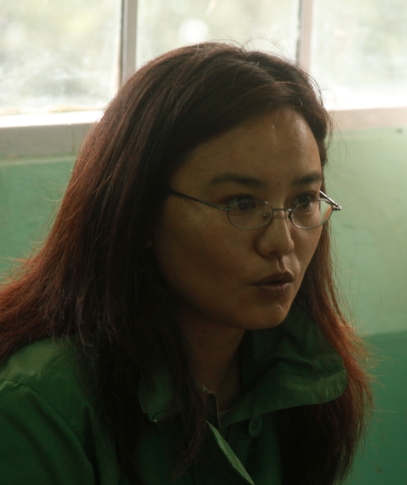This is the third in a series of interviews I conducted while working last summer in Dharamsala, India. I talked with leading members of the Tibetan exile community about the freedom movement and the future of Tibet.
"Strength comes from each human being and that is what we've based our movement on... It is the people that matter, the people that are carrying out the movement." So says Tsering Tsomo, Executive Director of the Tibetan Centre for Human Rights and Democracy (TCHRD), a Dharamsala NGO founded in 1996 (www.tchrd.org). Tsering is a petite woman but from her firm handshake to her inspiring words to her courage in meeting the challenges facing Tibet, it's obvious that meek is not one of her characteristics. She's been a driving force in making TCHRD a source of accurate and accessible information on the human rights situation in Tibet.
I met Tsering at her office on a cool, drizzly afternoon to talk about her journey thus far in the Tibetan activist network. As I got settled on the comfortable orange bench pillows, she brought tea and put her phone on mute, then said, "All right. Shall we get started?"
What's your background?
I am a Tibetan refugee, born and brought up in India. I did my schooling at a Tibetan refugee school in Mussoorie, and my graduate work at Delhi University. I also studied journalism at NYU but ended up as a human rights activist.
How did you get into journalism and activism?
My interest in journalism was triggered when I was 16 and met an Indian journalist working for India Today. We became friends and I was in awe of what he was doing. As far as activism, since childhood I haven't been able to tolerate injustice or repression.
Why did you decide to do graduate study at NYU?
There is a Tibet office in New York and they said that I should go to NYU and sent the application. Studying at NYU opened up my whole life; it was a once-in-a-lifetime experience.
How did you get involved with TCHRD?
There was a vacancy and I applied and got selected. It's really as simple as that.
What are the biggest misconceptions about TCHRD?
Some think we are a political organization but we are a human rights organization. We explicitly avoid involving ourselves in the autonomy issue. We believe that every human being has the right to decide what kind of political arrangement they would like to live in, a concept enshrined in the Universal Declaration of Human Rights.
What role does TCHRD play in the Tibet movement?
TCHRD monitors human rights violations inside Tibet. We aim to make it a premier research organization for human rights and also a world-class NGO that can represent Tibet and the issues that Tibetans are facing.
What are the Tibet movement's most pressing needs?
We have to be more passionate and focused, as well as confident about our own strength. We look at China and say how strong they are, and don't make the effort to realize how powerful we can be.
We also shouldn't get carried away by this need to be talked about. Sometimes to get written about, people tweak their voices to fit the narrative of the mainstream media. This is really unfortunate. At TCHRD, we bring the events in Tibet to the international community, but unadulterated and un-manipulated. You cannot play with people's sentiments and voices.
What has been the greatest transformation in the movement lately?
Self-immolation protests. It is not just about people getting out on the street with banners and slogans anymore. It is about real people killing themselves. This is a very disturbing development and I don't think a lot of Tibetans want this kind of change.
What direction do you see the movement going in?
It's a very difficult question. Until now, most people have seen the issue in terms of His Holiness the Dalai Lama. Now he is getting old and this is a fact of life. This is the moment when so many things that we decide will have enormous repercussions for our future.
What's the hardest part of your job?
Getting information about human rights violations from Tibet. Nobody knows exactly what's going on because of censorship and regulation by the Chinese government. Often we have to resort to "underground meets." It's ridiculous because it's not that the information we are trying to get is about terrorism and bombings. But the Chinese government is criminalizing the act of getting it out. NGO activists working in Africa can just go to Africa and talk to people. But we have to rely on second- or third-hand information and a lot gets lost in the process.
You have said, "We must live on hope." In the face of so many human rights atrocities, how can hope be developed and maintained?
People ask, "How can you be so optimistic when China is so strong and you guys have nothing?" I tell them that the freedom struggle is real and heartfelt. What matters are the intangible things, like being hopeful about the future and confident about your own strength. Strength comes from each human being and that is what we've based our movement on. If that is lost, I don't think we can go on for another day. It is the people that matter, the people that are carrying out the movement.
How do you cope on a daily basis with hearing about all the atrocities?
Ah! I have a headache, and a backache, almost every other day. You don't get any good news. The positive side is that my life has become more meaningful working here. You go home and reflect on what you've done that day and think about the people you've heard or written about, and you feel like you've made a difference in some small way.

